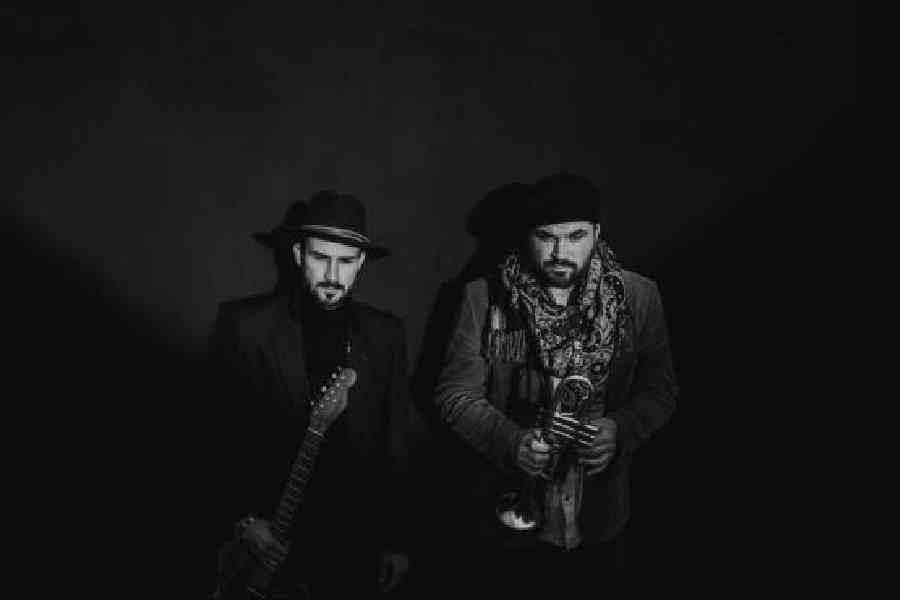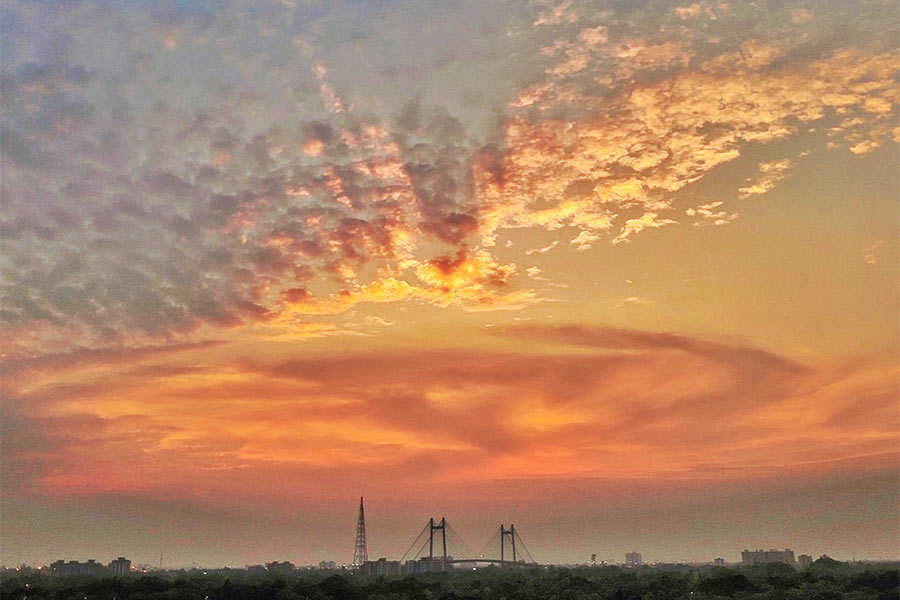Jazz Po Polsku, a jazz foundation from Poland, is on a world tour. As part of that, the duo of Polish artistes Piotr Damasiewicz (trumpet) and Kuba Wójcik (guitar) paid a visit to Calcutta. The two gave two stellar performances at Skinny Mo’s Jazz Club on Manoharpukur Road and wrapped up their last gig on International Jazz Day (April 30) at The Stein Auditorium at India Habitat Centre in Lodhi Colony, New Delhi. The artistes, along with Jakub Krzeszowski, the founder of Jazz Po Polsku, mainly focus on exploring the different cultures across the globe as a part of their Around the World project. t2 sat down for a chat with Damasiewicz and Wójcik. Excerpts.
How were your gigs in India?
We wrapped up gigs in Delhi, Gurgaon, Goa and Calcutta and we’re happy to be here for our international tour in India. We released two albums (Krew and Diavolezza) as a duo and we’re aspiring to incorporate our learnings of different cultures from our tour in the projects to come. India is very intense for us. There are a lot of things going on with a rich culture and it is indeed inspiring — from the yoga tradition to raga music. The gigs were amazing across the locations despite the hot weather. Goa, with the beach nearby and thriving nature, was too special. In the Calcutta gig, the reaction of the audience was great and they responded well to our compositions. The spiritual and cultural aspects of our music have been greatly inspired by what we saw in India. We explored new places and soaked in things differently.
How significant do you think it is to celebrate International Jazz Day?
We’ve had a great opportunity to play with musicians from across the globe, and it’s very similar to the idea of the project we’re on — the sole purpose being to connect with artistes and other people, learn from each other and share our knowledge. I think it’s an excellent opportunity to exchange ideas. This is a powerful force to create new music and Jazz Po Polsku gives the chance to exchange energies, which is very important as musicians.
From the Himalayas to the Alps, you’ve attended residencies on steep slopes and the hills. How has it impacted you?
We attended a prestigious residency called in 2021 and it was two to three weeks of living in a small town in an old house in the hills. There we worked on our albums, spoke music and connected. We walked through the mountains and played two concerts, one of which made it to our album Diavolezz, named after a peak we reached during our trek. When you travel, you learn, you transcend and there’s a spiritual upliftment. The energies are elevated in the Himalayas in Nepal. When we crossed the border of Europe, we also crossed a mental border. We visited different temples, monasteries and churches and got very inspired by the meditativeness and contemplative nature of our tour. We climbed up some ladders in our head and, as artistes, it has emancipated us. Natural elements and the environment became inspirational for us. During the pandemic, society transferred some negative energy and climbing up the mountains helped us recover.
How do you incorporate culture into instrumental music?
The kind of music that we do is improvisational, but whatever we play comes from whatever we see, experience and learn. Each of the tunes we practice comes from cultural and socio-political aspect and also nature. From visuals to conversations, new things spotted, and cultural exchange, we’re telepathically connected with each other and, of course, listening to people’s music in the process gives us an insight into what to create next. For both of us, we’ve a strong telepathic connection and when one begins the notes, the other ebbs along like it was written fate. Indian ragas and yogic chants are some of the things we’ve picked up and can translate it into the pieces that we play. It enhances our soundscape and it helps us improvise as the root of improvisation is to pick up pieces from our lives and fill it into the puzzle. From the harmonic aspect of the jazz music, how it is created — its entwined with society and experiences gathered. We become more open, focus on listening and concentrate on the emotions, bridging the gap and having an artistic crossover. Our goal is to transcend the musical and mental boundaries by drawing inspiration from the variety of cultures and environments. We intend to create unique projects in collaboration with local musicians from both of the countries, establishing firm bonds between different musical worlds. We feel a lot of creations are done subsconsciously. So, when we see landscapes, people and situations, it stays in our heads and when we play we think.
What’s the most fun aspect of jazz music?
There are a lot of fun parts. Improvisation is the best! When we go on stage with other people, some magic may happen. It’s always worth the anticipation. It’s not just with the craft, but when you’re on stage with different people, not so prepared, the spiritual exchanges causes the magic to happen. You’re more open to embrace new experiences then! You can feel the deep connections with other musicians and it’s really amazing, travelling through the different worlds of music is beautiful, you grow through what you learn in the process. It’s an important aspect of jazz. Jazz is absurd and you don’t always know what to expect, it goes with the flow and tells stories, it’s about freedom.
What do you mean by freedom here?
We feel ourselves on stage, we feel free and we can make music.
Coming to the freedom aspect, freedom is sometimes replaced with commercial pressures. What are your thoughts on it?
It is a difficult thing! We’re lucky to play the jazz the way we perceive it, by composing originals. Commercial music is financially better for people, of course — jazz world is difficult — but it isn’t easy. We need to manage our things, balance our work, produce music, fund and it’s a lot of hard work. But it’s worth it! Have no expectation from the art, just keep doing better is our motto!
In the city of joy what food did you try out and did you like it?
We went bustling on the streets and saw mutton curry plus rice being served, the street food as well. The food aspect of Calcutta is fascinating and we did try out some Bengali food on the streets like the daily commuters and corporates. It was spicy, but tasty (laughs).
And in Goa and Delhi, how was your experience?
Goa was beautiful. Chilling by the beach and the cool sea breeze, jamming a little and enjoying the serenity, we loved our stay in Goa! In Delhi, we met a man, an ex-diplomat, who was indeed amiable. He took us for a temple visit and later invited us over for dinner. It was a traditional Indian vegeterian platter, almost plated to perfection and we got a glimpse of culture there too, and it was impressive!






